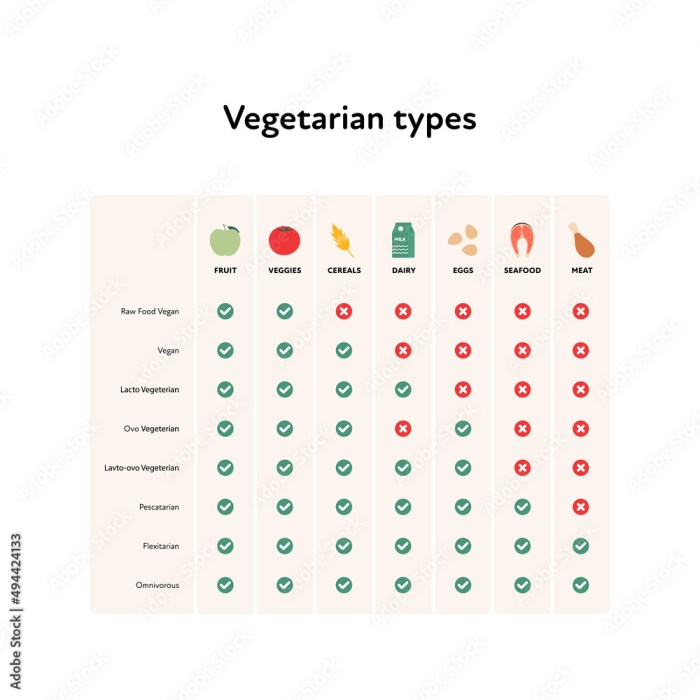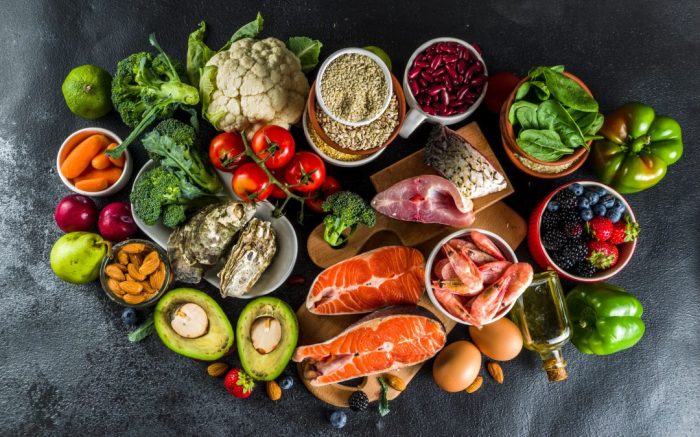Vegan vegetarian pescatarian – In the realm of nutrition, the triumvirate of vegan, vegetarian, and pescatarian diets reigns supreme, offering a spectrum of choices that cater to diverse ethical, health, and environmental concerns. As the world embraces plant-based lifestyles, this comprehensive guide unravels the nuances of each dietary approach, empowering readers to make informed decisions about their food choices.
From exploring the potential health benefits and risks to delving into the ethical considerations and practical implications, this discourse provides a thorough examination of veganism, vegetarianism, and pescatarianism, leaving no stone unturned in the quest for optimal nutrition and well-being.
Definition and Overview
Veganism, vegetarianism, and pescatarianism are three distinct dietary choices that have gained popularity in recent years. These dietary patterns vary in their restrictions and allowances, offering different approaches to healthy eating.
Veganism is the most restrictive of the three, excluding all animal products, including meat, dairy, eggs, and honey. Vegetarians abstain from consuming meat, poultry, and fish but may include dairy, eggs, and honey in their diet. Pescatarians, on the other hand, consume fish and seafood but avoid other types of meat.
Key Differences
- Animal Products:Vegans exclude all animal products, vegetarians exclude meat, poultry, and fish, while pescatarians include fish and seafood.
- Protein Sources:Vegans rely on plant-based proteins like beans, lentils, and tofu, while vegetarians may also include dairy and eggs. Pescatarians have access to fish and seafood as protein sources.
- Nutritional Considerations:Vegans need to pay attention to vitamin B12, iron, and calcium intake, while vegetarians may need to supplement vitamin B12. Pescatarians generally have fewer nutritional concerns due to the inclusion of fish.
Similarities
- Health Benefits:All three dietary choices have been associated with improved health outcomes, including reduced risk of chronic diseases like heart disease and certain types of cancer.
- Ethical Considerations:Many vegans and vegetarians choose their diets based on ethical concerns about animal welfare and environmental sustainability.
- Plant-Based Focus:All three dietary patterns emphasize the consumption of plant-based foods, including fruits, vegetables, whole grains, and legumes.
Health Implications

Vegan, vegetarian, and pescatarian diets have distinct health implications that warrant consideration. These dietary choices offer varying nutrient profiles, which can impact disease risk, overall well-being, and longevity.
Nutrient Intake
Vegan diets provide a rich source of fiber, antioxidants, and phytochemicals, which have been linked to reduced risks of cardiovascular disease, certain cancers, and type 2 diabetes. However, vegans must pay careful attention to ensure adequate intake of essential nutrients such as vitamin B12, iron, calcium, and omega-3 fatty acids.Vegetarian diets generally provide a more diverse range of nutrients than vegan diets, as they include dairy and eggs.
Vegetarians may still face challenges in meeting their iron and vitamin B12 needs, but the inclusion of dairy products can help mitigate these concerns.Pescatarian diets offer a balance of nutrients from both plant and animal sources. Fish is a rich source of omega-3 fatty acids, which are essential for heart and brain health.
If you’re looking to switch to a plant-based diet, there are plenty of vegetarian diet meals that can satisfy your taste buds. From hearty stews and flavorful curries to refreshing salads and savory pasta dishes, the options are endless. These meals are not only packed with nutrients but also versatile enough to accommodate various dietary restrictions and preferences.
However, pescatarians should be mindful of potential contaminants in seafood, such as mercury.
Disease Prevention
Observational studies have suggested that vegan and vegetarian diets may be associated with a lower risk of certain chronic diseases, including heart disease, stroke, and type 2 diabetes. The high intake of fruits, vegetables, and whole grains in these diets may contribute to their protective effects.Pescatarian diets have also been linked to a reduced risk of heart disease, thanks to the consumption of omega-3 fatty acids from fish.
Additionally, fish is a good source of protein, which is essential for maintaining muscle mass and overall health.
Overall Well-being
Vegan, vegetarian, and pescatarian diets can all support overall well-being by promoting healthy body weight, reducing inflammation, and improving mood. The high fiber content in plant-based diets can aid in weight management and promote satiety.Pescatarian diets, with their inclusion of fish, provide a source of lean protein that can support muscle growth and repair.
If you’re looking for a healthy and compassionate way to eat, vegetarian diet meals are a great option. They’re packed with nutrients, antioxidants, and fiber, and they can help reduce your risk of heart disease, stroke, and certain types of cancer.
Additionally, the omega-3 fatty acids in fish have been shown to have anti-inflammatory properties, which can benefit overall health and well-being.It’s important to note that the health implications of these dietary choices can vary based on individual factors, such as overall health, lifestyle, and genetic predispositions.
Consulting with a healthcare professional or registered dietitian can help ensure a well-balanced and nutritious diet that meets individual needs.
Ethical Considerations
Veganism, vegetarianism, and pescatarianism are often motivated by ethical concerns. Ethical considerations encompass a range of issues related to the treatment of animals, the environment, and the impact on food systems.
Animal welfare is a primary concern for many vegans and vegetarians. They believe that animals have the right to live free from exploitation and suffering. The intensive farming practices used in the meat industry are often seen as cruel and inhumane, and many people choose to avoid consuming animal products as a way to protest these practices.
Environmental Sustainability
Environmental sustainability is another important ethical consideration for many vegans and vegetarians. The production of meat has a significant environmental impact, contributing to greenhouse gas emissions, water pollution, and deforestation. By choosing to eat plant-based foods, vegans and vegetarians can help to reduce their environmental footprint.
Impact on Food Systems
The choice to adopt a vegan, vegetarian, or pescatarian diet can also have an impact on food systems. The demand for animal products has led to the industrialization of agriculture, which has had a number of negative consequences, including the displacement of small farmers, the loss of biodiversity, and the increased use of antibiotics and pesticides.
By choosing to eat less meat, vegans, vegetarians, and pescatarians can help to support more sustainable food systems that are better for both people and the planet.
Practical Considerations
Adopting and maintaining a vegan, vegetarian, or pescatarian diet requires some practical considerations. This section provides tips and guidance on meal planning, grocery shopping, and dining out options to help you navigate these dietary choices.
Meal planning is crucial for ensuring you meet your nutritional needs. Plan your meals in advance to avoid impulsive decisions or unhealthy choices. Consider using online resources or apps to find recipes and create meal plans.
Grocery Shopping
- Read food labels carefully to identify vegan, vegetarian, or pescatarian-friendly ingredients. Look for certifications from reputable organizations like the Vegan Society or Vegetarian Resource Group.
- Explore specialty grocery stores or sections that cater to vegan, vegetarian, and pescatarian diets. These stores offer a wider variety of options and may have knowledgeable staff to assist you.
- Consider joining a community-supported agriculture (CSA) program to receive fresh, locally grown produce that supports sustainable farming practices.
Dining Out
- Research restaurants in advance to identify those with vegan, vegetarian, or pescatarian options. Many restaurants now offer separate menus or clearly label their dishes.
- Don’t hesitate to ask questions about menu items and ingredients. Be specific about your dietary restrictions and ask for recommendations from the staff.
- Carry snacks or pack your own meals if you’re unsure about finding suitable options at restaurants. This will help you avoid hunger or making unhealthy choices.
Subcategories and Variations: Vegan Vegetarian Pescatarian
Within each dietary choice, there are various subcategories and variations that cater to different preferences and lifestyles.
These variations offer flexibility and allow individuals to tailor their dietary choices to their specific needs and values.
Raw Veganism
Raw veganism is a strict form of veganism that involves consuming only uncooked, plant-based foods.
Raw vegans believe that cooking food destroys enzymes and nutrients, reducing its nutritional value and health benefits.
Flexitarianism
Flexitarianism is a semi-vegetarian diet that primarily focuses on plant-based foods while occasionally incorporating meat or fish into the diet.
Flexitarians aim to reduce their meat consumption for ethical, environmental, or health reasons.
Lacto-Vegetarianism
Lacto-vegetarianism is a vegetarian diet that includes dairy products such as milk, cheese, and yogurt.
Lacto-vegetarians believe that dairy products provide essential nutrients and do not involve the exploitation of animals.
Cultural and Regional Influences

Veganism, vegetarianism, and pescatarianism are influenced by a myriad of cultural and regional factors. Traditional diets, religious beliefs, and social norms play a significant role in shaping the prevalence and practices of these dietary choices.
In many Asian cultures, vegetarianism has a long history rooted in religious beliefs such as Buddhism and Hinduism. In India, for example, a significant portion of the population adheres to a vegetarian diet, influenced by the belief in the sacredness of all life.
In contrast, in Western cultures, veganism and vegetarianism have gained popularity in recent years primarily due to concerns about animal welfare and environmental sustainability.
Traditional Diets
Traditional diets often reflect the availability of local resources and the cultural values of a region. In coastal areas, pescatarianism may be more prevalent due to the abundance of seafood. In regions with limited access to animal products, vegetarianism or veganism may be the norm.
Religious Beliefs
Religious beliefs can have a profound impact on dietary choices. Many religions, such as Buddhism, Jainism, and Seventh-day Adventism, promote vegetarianism or veganism as a way to adhere to principles of non-violence and compassion towards animals. In some cultures, religious fasting or dietary restrictions may also contribute to the adoption of plant-based diets.
Social Norms
Social norms and peer pressure can influence dietary choices. In certain social groups, veganism or vegetarianism may be seen as a sign of environmental consciousness or ethical values. Conversely, in other cultures, meat consumption may be considered a symbol of wealth or status.
Current Trends and Future Outlook

In recent years, plant-based diets have gained significant popularity, driven by growing awareness of their health benefits, environmental sustainability, and ethical concerns. Technological advancements have also played a crucial role in the development of innovative plant-based alternatives to traditional animal products, making them more accessible and appealing to a wider audience.
Plant-Based Foods on the Rise
- The global plant-based food market is projected to reach $74.2 billion by 2027, with a compound annual growth rate (CAGR) of 11.9% from 2020 to 2027.
- Plant-based meat alternatives, such as tofu, tempeh, and seitan, are becoming increasingly popular as they offer a similar taste and texture to meat while being lower in saturated fat and cholesterol.
- Plant-based dairy alternatives, such as almond milk, soy milk, and oat milk, are also gaining traction due to their nutritional value and lower environmental impact compared to cow’s milk.
Technological Advancements
Technological advancements are revolutionizing the development of plant-based foods. Innovations such as fermentation and extrusion techniques allow manufacturers to create plant-based products that mimic the taste, texture, and nutritional value of animal products more accurately.
- For example, Impossible Foods uses a heme molecule derived from plants to create a plant-based burger that “bleeds” like beef.
- Beyond Meat employs advanced extrusion technology to create plant-based chicken strips that are indistinguishable from traditional chicken in terms of taste and texture.
Future Predictions
The future of plant-based diets is promising, with experts predicting continued growth and innovation in this sector.
- Plant-based meat and dairy alternatives are expected to become increasingly affordable and accessible, making them a more viable option for consumers.
- Technological advancements will continue to drive the development of new and improved plant-based products, offering consumers a wider range of choices.
- As awareness of the health, environmental, and ethical benefits of plant-based diets grows, it is likely that more people will adopt these dietary choices in the future.
Case Studies and Success Stories
Many individuals have successfully adopted and maintained vegan, vegetarian, or pescatarian diets. These individuals have experienced various challenges and benefits along their journeys.
Challenges Faced
Adopting a plant-based or pescatarian diet can involve some challenges. Common obstacles include:
- Dietary restrictions: Eliminating certain food groups can limit food choices and require careful meal planning.
- Social pressures: Societal norms and peer influences can make it difficult to stick to a non-traditional diet.
- Nutritional deficiencies: Ensuring adequate intake of essential nutrients like vitamin B12, iron, and calcium requires planning and supplementation.
Benefits Experienced
Despite these challenges, individuals who adopt plant-based or pescatarian diets often experience significant benefits. These include:
- Improved health: Plant-based diets have been linked to lower risks of heart disease, type 2 diabetes, and certain cancers.
- Increased energy levels: Eliminating processed foods and animal products can improve digestion and boost energy.
- Ethical considerations: Many individuals choose plant-based or pescatarian diets for ethical reasons, such as animal welfare or environmental concerns.
Success Stories
Numerous individuals have shared their inspiring stories of adopting and maintaining plant-based or pescatarian diets. Here are a few examples:
- John Robbins: A former ice cream entrepreneur, Robbins became a vegan after reading a book about the health benefits of a plant-based diet. He has since written several books and founded the nonprofit organization Food Revolution Network.
- T. Colin Campbell: A renowned nutrition researcher, Campbell has dedicated his career to studying the relationship between diet and disease. His research has shown that plant-based diets can promote health and longevity.
- Gwyneth Paltrow: The actress and entrepreneur has been following a mostly plant-based diet for several years. She has credited her diet with improving her health, energy levels, and overall well-being.
These stories demonstrate the transformative power of plant-based and pescatarian diets. By embracing these dietary choices, individuals can improve their health, reduce their environmental impact, and make a positive ethical statement.
Resources and Support
Individuals exploring or adopting vegan, vegetarian, or pescatarian diets can access a wealth of resources and support to guide their journey. Reputable organizations, websites, and online communities provide comprehensive information, guidance, and encouragement.
These resources offer a wide range of support, including:
Online Communities and Support Groups, Vegan vegetarian pescatarian
- Online forums and social media groups connect individuals with others following similar dietary choices, fostering a sense of community and shared experiences.
- Support groups provide a safe and confidential space for individuals to share their challenges, successes, and insights, offering emotional support and motivation.
Educational Materials
- Websites and books offer comprehensive guides to the nutritional aspects of vegan, vegetarian, and pescatarian diets, including meal planning, nutrient requirements, and potential health benefits.
- Online courses and workshops provide in-depth knowledge on plant-based nutrition, cooking techniques, and the ethical and environmental implications of these dietary choices.
Reputable Organizations
- The Vegan Society: A leading advocate for veganism, providing information, resources, and support to individuals transitioning to or living a vegan lifestyle.
- The Vegetarian Resource Group: A non-profit organization dedicated to promoting vegetarianism and providing evidence-based information on plant-based diets.
- SeaChoice: A Canadian organization that provides science-based recommendations on sustainable seafood choices, supporting pescatarians in making informed decisions about their fish consumption.
Closing Summary
Whether driven by ethical concerns, health aspirations, or environmental consciousness, the adoption of vegan, vegetarian, or pescatarian diets empowers individuals to make a positive impact on their own well-being and the world around them. As the understanding of these dietary choices continues to evolve, the future holds exciting possibilities for plant-based innovation and culinary exploration, ensuring that the power of plant-based nutrition remains a beacon of health and sustainability.
Questions Often Asked
What is the key difference between veganism and vegetarianism?
Veganism excludes all animal products, including meat, dairy, eggs, and honey, while vegetarianism allows for the consumption of dairy and eggs.
Is a pescatarian diet considered a type of vegetarianism?
No, pescatarianism is not a form of vegetarianism as it includes the consumption of fish and other seafood.
Are there any health risks associated with veganism?
A vegan diet can be nutritionally adequate, but it requires careful planning to ensure sufficient intake of essential nutrients such as vitamin B12, iron, and calcium.